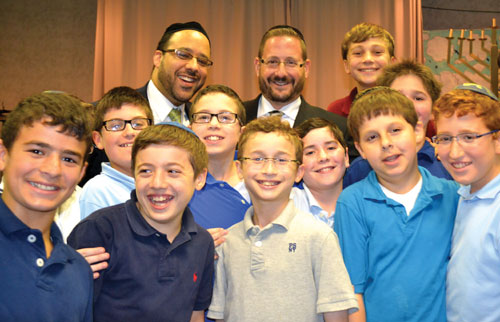.jpg)
.jpg)
Teaneck—MK Rabbi Dov Lipman, 42, an American oleh whirled through towon on the weekend of Oct. 4-6. In addition to sitting for an interview with JLBC, his spoke at local schools (Ma’ayanot, TABC, RYNJ), shuls (B’nai Yeshurun, Rinat Yisrael, and Netivot Shalom), the Kaplen JCC in Tenafly, and made an appearance at YU. Lipman here officially to accompany Israel’s new Finance Minister and the founder of the Yesh Atid party, Yair Lapid, who is a critical partner in PM Bibi Netanyahu’s governing coalition. Lipman is the first American MK since Meir Kahane.
Unofficially, Lipman barnstormed through Bergen County to win the hearts and minds of the community. The consensus was that he did a pretty good job of it. Those who heard him speak at the various shuls, even the cynics, seemed impressed and positive. Lipman was painting a picture of a new, refreshing approach to governing Israel and a party—Yesh Atid—that was interested in representing and engaging with every member of Israeli society. For many Israel-watchers, this was the first time in years that something so fresh and positive emanating from the Knesset.
Lipman rose to prominence by serving as a vocal community activist in his hometown of Beit Shemesh and was deeply involved in trying to mediate and prevent the verbal attacks, protests and violence committed by a small group of extremist haredim who were opposed to the presence of a Modern Orthodox school near a haredi area in Beit Shemesh. Especially troublesome to haredim in Israel, Yesh Atid is controversial because it supports and promotes the law drafting Israeli haredim into the army or community service. This position has earned him few friends among the haredi community.
This, however, doesn’t faze him. “I don’t care what Mishpacha magazine or other haredi media are writing about me….It is my job to be mefarnes (to help provide a source of support) the people of Israel and that is what I intend to do.”
He emphasized that many haredi leaders are working with him directly and discreetly and cited the recent opening of a number of haredi hesder yeshivot (combining army service and Torah study) and mesivtot (high schools) where secular studies are being taught and plans are on the drawing board for more. He also emphasized that he recognizes that all changes and shifts will take significant time and the laws being designed by Israeli lawmakers are being written to take this into account.
He also explained that he is trying to draw haredi attention to a letter from the Chazon Ish which notes that the Jewish community in Israel will need two strong generations after the Shoah to recover and focus on renewing and rebuilding the yeshivot and strong Torah communities. Now that this has been established, Lipman feels that it’s time to focus on issues like improving education and better job training for the many that are not cut out for full-time Torah learning.
Although haredi-related issues top his agenda and he is the formal liaison between the party and the haredi leadership in Israel, other matters, like freeing agunot and ensuring that hundreds of thousands of Russian immigrants who have Jewish backgrounds are able to convert properly are high on his agenda of concerns.
A line he repeated both in shul and school speeches is that the position he holds today and his whole life and his current position in the Knesset is a “stam chalom” (roughly translated as a “straight dream”). The fact that he, an oleh from Silver Spring, is now sitting in the Knesset, is a “Stam Chalom.” All that Israel has accomplished since its founding is a “Stam Chalom.” In this vein, all that he hopes to accomplish in helping to repair the breach between the haredi and chiloni communities in Israel will also be a “Stam Chalom.”
His main message to JLBC and the Teaneck community is that he and his party—virtually all of the members never served in politics before joining Yesh Atid—are not afraid of trying to solve the toughest and most important issues facing Israeli society. He and his fellow party members—he calls them his new family and learns regularly with them in weekly Torah classes—are united on a joint mission together to solve Israel’s most pressing problems.
By Moshe Kinderlehrer









